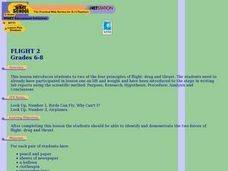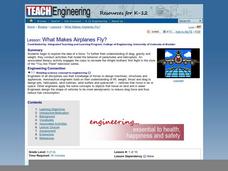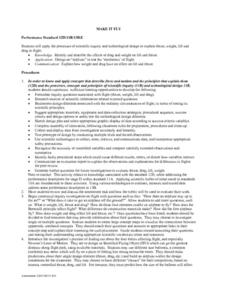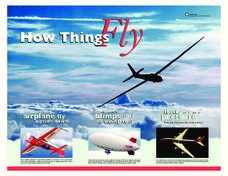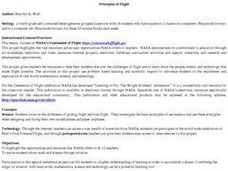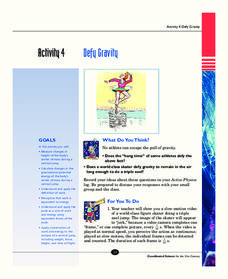Curated OER
Wright Again: 100 Years of Flight
Aspiring aeronautical engineers demonstrate different forces as they construct and test paper airplanes. This lesson plan links you to a website that models the most effective paper airplane design, an animation describing the forces...
Curated OER
Graphing the Four Forces
Using the Cartesian coordinate system, future flight experts plot points to determine whether or not an airplane will fly. With the four forces of weight, lift, drag, and thrust represented in different quadrants, your physics learners...
Curated OER
Flight
Students are introduced to the four forces of flight--drag, lift, thrust, and weight--through a variety of fun-filled flight experiments. They "fly" for short periods and evaluate factors that might either increase or decrease their...
Curated OER
Strawkets and Weight
Students investigate the effect that weight has on rocket flight. They construct a variety of straw-launched rockets that have different weights, observe what happens when the weight of a rocket is altered by reducing its physical size...
Curated OER
Four Forces of Flight
Students explore the four forces of flight. They investigate the four forces of flight: lift, drag, thrust and weight (gravity). They experiment with flight-testing various objects commonly found around the house and constructing paper...
Curated OER
Flight 2
Young scholars are introduced to two of the four principles of flight: drag and thrust. As the class watches a video on these principles, they utilize ballons, straws and clothepins to simulate what they're seeing in the show. Nice,...
Curated OER
How Airplanes Fly?
Fifth graders explore drag, thrust, lift and weight. In this airplane lesson, 5th graders define the forces that effect airplanes and design a model airplane. Students compare their models for the...
Curated OER
What Makes Airplanes Fly?
Young scholars examine force and conduct activities that model parachutes and helicopters. In this airplanes lesson students identify the forces that make airplanes fly higher and land.
Curated OER
How Things Fly
Students will examine the physics of flight through using experimental inquiry. In this lesson, you'll introduce your students to the four forces of flight--drag, lift, thrust, and weight--through a variety of fun-filled flight...
Curated OER
MAKE IT FLY
Young scholars utilize the process of scientific inquiry and technological design to explain thrust, weight, lift and drag in flight. They design an "airplane" to test the "mechanics" of flight. In addition, they brainstorm and sketch a...
Curated OER
Boomerangs Keep Coming Back
Students investigate the flight of paper boomerangs. In this flight lesson, students examine the flight variables of paper boomerangs, which they make, by investigating the concepts of lift and drag. They examine what happens when an...
Curated OER
What Makes Thing Fly?
Second graders study lift, drag and thrust from a real flight instructor. In this physical science activity students build and fly paper airplanes and experiment with variations and design.
Curated OER
THE FLIGHT PLATFORM
Students examine forces that effect flight. In this flight lesson students answer questions that are asked of them and the ones that they ask themselves.
Curated OER
How Things Fly
Students explain basic principles of aeronautics such as gravity and lift. In this How Things Fly lesson, students visit the interactive, hands-on How Things Fly gallery at the Smithsonian. Students perform three experiments that...
Curated OER
Dayna Lykins, Leanna Prater
Fourth graders compare and contrast gliding flight and true flight. They investigate the basic principles of aeronautics. The class participates in activities to observe lift and the effect of air. Students design and fly their own...
Curated OER
IS MASS THE SAME AS WEIGHT?
Learners see the difference between weight and mass when they examine the method of measuring each of them.
Curated OER
Look Mom, No Wings!
Students explain how drag, weight, lift and thrust work together to make something fly. In this physics lesson, students measure their jump height and record data on the table. They reason out why they can't remain airborne for long.
Curated OER
Swinging on a String
Students explore how pendulums work and why they are useful in everyday applications. In a hands-on activity, they experiment with string length, pendulum weight and angle of release.
Curated OER
Aviation, Aeronautics and Aerodynamics
Young scholars investigate the physics of flight through various experiments. In this physics lesson plan, students construct different flying objects. They explain the dynamics that make these object fly.
Curated OER
How do engineless planes stay aloft?
Fifth graders explore how a plane can stay aloft. In this engineless airplane flying lesson, 5th graders experiment to find how the design of a plane and Bernoulli's principle keep planes in the air. Student's create a plane and answer...
Curated OER
Full of Hot Air
Students investigate technology and its many designs to make our lives easy. In this science lesson, students build a hot air balloon and answer specific questions about weight and rides in the hot air balloon. They analyze their data...
It's About Time
Defy Gravity
Test the limits of gravity while encouraging full class participation with this thrilling lesson. Pupils investigate the meaning of work and how it is equivalent to energy. They explore the joule and apply it as a unit of work. They...
Curated OER
Measuring Work
Students explore what work is, measure work done in moving an object, and tell how energy is related to work in both machines and the human body. In this measuring work lesson plan, students walk up a flight of stairs, measure the height...
Curated OER
Aerodynamics
Students discover the basic principles of aerodynamics, including the roles and identity of natural forces involved. They examine how the force of gravity is overcome by the curved shape of an airplane wing and air pressure.





